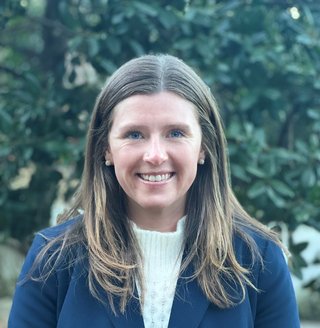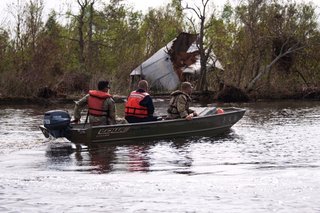Employee Profile: Lauren Buss
June marks the beginning of Hurricane Season in the United States, putting public health officials, emergency managers, and first responders on high alert to ensure that at-risk areas are well-prepared to prevent damage, respond quickly, mitigate negative impact, and recover equitably. For Lauren Buss, a Social Science Research Analyst and Team Lead at HHS-OIG, however, ensuring that the country is equipped to prepare, handle, and recover from emergencies is not only a focus during Hurricane Season; it is a year-round priority.

Lauren came to OIG as a Pathways Intern while finishing up her master’s degree in Public Health at Emory University. Sharing a campus with the Centers for Disease Control (CDC) in Atlanta made her particularly aware of the importance of emergency preparedness and the vast public service opportunities to contribute as a federal employee. Having already developed an interest in health policy as an undergraduate at the University of Georgia, Lauren’s interest only grew after joining the Atlanta regional office of OIG’s Office of Evaluation and Inspections (OEI).
For Lauren, emergency preparedness is only growing more important as the world becomes complex and intertwined. As she notes, the COVID-19 pandemic illustrated how an increasingly interconnected world elevated the importance of sufficient preparation, mitigation, and recovery. OIG’s role is to “ensure that HHS does as best as it can and continues to improve” as one of the largest supporters of emergency response efforts nationwide.
Since joining OIG in 2017, Lauren has worked on a myriad of reports pertaining to emergency preparedness. Following concerns that CDC personnel did not have access to adequate personal protective equipment (PPE) when screening travelers at the onset of the COVID-19 pandemic, Lauren was a part of the team that identified ways that HHS could better protect those who “were willing to step up to the plate” and had put their own health at risk to protect that of the whole country.
Lauren and her team are currently working on a report to strengthen nursing homes’ emergency preparedness efforts, a project borne out of the devastating impact of Hurricane Ida on nursing homes in Louisiana. The forthcoming report will determine the adequacy of state survey agencies’ current oversight and identify ways that HHS can better protect vulnerable nursing home residents. Working on such a pertinent report, and one that furthers a top priority for Inspector General Christi A. Grimm, has been a high point for Lauren in her career. “I get to feel every day like I’m doing good,” she says.
In addition to undertaking crucial evaluations, Lauren expressed her excitement at the opportunity to lead several projects that will enable OIG to conduct its oversight of emergency-related efforts more quickly and effectively. Inspired by “a culture of continuous improvement, improving outcomes, and finding creative solutions” that she observed while on a detail at the Federal Emergency Management Agency (FEMA), Lauren has brought this mindset to her work at OIG. Daily, she works to “find creative solutions to challenges” and “create a collaborative tone” with all the players involved in an emergency response effort.
One such project Lauren is working on is the creation of a Rapid Assessment Framework, which will allow OIG evaluators to “get into the field while the emergency is happening and issue corrective actions” in real time. Already, Lauren has found these opportunities hugely beneficial, having shadowed first responders during both Hurricane Ian and the Kentucky flooding last year.
Lauren also notes a collaborative effort she is leading with OIG’s Office of Management and Policy (OMP). Leveraging OMP’s access to Geographic Information System (GIS) technology, Lauren is working on creating a geospatial tool to “enhance OIG’s ability to see what’s happening on the ground.” One of the many potential applications of this tool is enabling OIG evaluators to see how different nursing homes are being affected by a severe storm. This innovation and partnership will ensure that OIG, too, is ready for this upcoming Hurricane Season.
Not only do these projects enable Lauren to “help people on a broader scale and drive positive change at HHS,” but they also allow her to work alongside fellow public servants who are also “people-focused” and who possess the same “excitement for impact and dedication to the mission.”
It is for this reason that Lauren enjoys her work at HHS-OIG so much. “Emergency management and OEI share a common value of continuous improvement: looking at where the problem is and how we can fix it,” she says. “Our mission is so exciting—it aligns with my values and offers a unique opportunity to make a meaningful difference for the U.S. healthcare system, as well as for my neighbors.”

